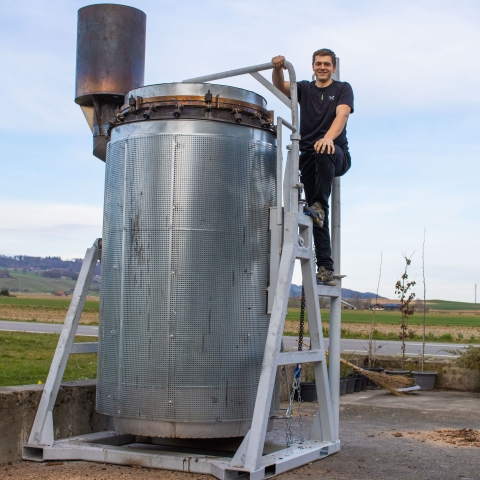Retort for the production of barbecue charcoal and biochar from local waste wood
Charcoal retort
In 2018, Oliver Reinhard, a young forest science student, discovered that most barbecue charcoal bought in Switzerland comes from faraway countries such as Poland or Namibia.
The sources are often obscure and the quality inferior, meaning that a lot of smoke and harmful exhaust gases are produced during combustion.
Oliver has solved the problem by producing his own charcoal from waste from a neighboring sawmill and using a retort with complete exclusion of oxygen. This locally produced barbecue charcoal sells well to sustainability-conscious customers and barbecue professionals.
Region of origin
2657895
Type of wood
Recycled or waste wood
Origin of wood
Industry
Mobilization Potential
> 20'000 m³ for Switzerland
Kind of wood concerned
Residual and waste wood
Sustainability Potential
Nutzen regionaler Ressourcen und verbessertes Waldmanagement
Impact on environment & biodiversity
Reduces overexploitation in forests abroad.
Reduces transportation.
Avoids harmful exhaust gases.
Ease of implementation
Retort must be purchased. Coal production is simple.
Economic impact
Added value for the local wood value chain
Job effect
Generates local employment
Income effect
higher margin
Specific knowledge needed
none
Costs of implementation ( Euro - € )
30000.00 €
Pictures copyright
Oliver Reinhard
Domain
Products, markets, trade
Forest-based bio/circular economy
Keywords
Charcoal upcycling retort
Challenge addressed
6.- Grow the forest-based bioeconomy through circular use and value-added products
Digital solution
No
Innovation
Yes
Country of origin
Switzerland
Region of origin
2657895
Scale of application
Regional/sub-national
Start and end year
2023 - 2025Main website
Project reference
Barbecue charcoal and biochar
Project website
Post date
Wednesday, 3 January, 2024 - 12:39
Project under which this factsheet has been created
Rosewood 4.0

